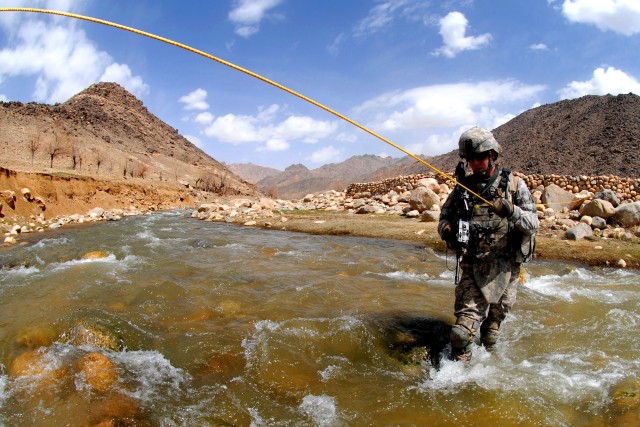
WASHINGTON, March 27, 2009 - President Barack Obama today announced the outcome of his administration's Afghanistan-Pakistan policy review, calling for increased aid to both countries and a need for more civilian and international support.
"Security demands a new sense of shared responsibility," Obama said in an address from the Eisenhower Executive Office Building here. "Together, we must enhance intelligence sharing and military cooperation along the [Afghan-Pakistan] border, while addressing issues of common concern like trade, energy and economic development."
Obama said the future of Afghanistan is "inextricably" linked to the future of Pakistan, as al-Qaida and other extremists have moved freely across the two countries' shared border since 9/11, planning attacks and training. He called the border region "the most dangerous place in the world" for the American people, but added that the issue is "an international security challenge of the highest order."
"The safety of people around the world is at stake," the president said, noting that terrorist attacks in London, Bali, Islamabad and Algeria over the past two decades were all tied to al-Qaida elements and safe havens in Pakistan.
"It is important for the American people to understand that Pakistan needs our help in going after al-Qaida," he continued. "[Pakistan's] ability to destroy these safe havens is tied to its own strength and security."
The weakness of Pakistan's central government and waning economy is indirectly responsible for al-Qaida's ability to harbor and operate safe havens along the border region. The review calls for Congress to authorize $1.5 billion in support for the Pakistan people annually over a five-year course to build schools, roads and hospitals to strengthen the country's democracy, Obama said.
Also, the review calls for Congress to pass a bill that creates "opportunity zones" in the border regions "to develop the economy and bring hope to places plagued by violence," he added. "A campaign against extremism will not succeed with bullets or bombs alone.
"I do not ask for this support lightly," he continued. "These are challenging times, and resources are stretched, but the American people must understand that this is a down payment on our own future."
On Afghanistan's side of the border, Obama said the United States and partner nations must prevent the country from becoming the safe haven it was prior to 9/11. The gains of the resurgent Taliban over the past year must be reversed. Allied forces must "promote a more capable and accountable Afghan government," he said.
Ground commanders in Afghanistan have expressed the need for additional resources for more than three years, and with the drawdown of forces in Iraq, those resources are now available. The additional 17,000 U.S. Soldiers and Marines he authorized for Afghanistan last month will impact greatly, Obama said.
Those resources, according to the new strategy, will support an emphasized shift in the Afghanistan mission to focus efforts on increasing the size and capacity of the Afghan army and police with training, he said. Although, more U.S. resources and troops are available for the Afghan mission now, Obama stressed the importance of the Afghan security forces eventually taking the lead in their own country.
"That is how we will prepare the Afghans to take responsibility for their security, and how we will ultimately be able to bring our troops home," he said.
The president said that in late spring, after the first wave of U.S. reinforcements hit the ground, the effort to train Afghan police and army units will be fully resourced for the first time since combat operations began there in 2001. He said every American unit will be partnered with an Afghan army or police unit, and that additional support has been requested for NATO trainers.
Obama said he hopes those efforts will grow the Afghan army from 82,000 to 134,000 as well as increase the size of the police to 82,000 by 2011. These increases may very well be needed, he added, as the United States and NATO work on plans to turn over security responsibilities to the Afghans.
The increase in troops and military resources must be accompanied by civilian efforts, too, including State Department personnel and the U.S. Agency for International Development as well as their NATO and international counterparts. Afghanistan's government is democratically elected but plagued by corruption, while the economy remains undercut by narcotics trade, he said.
Obama called for agricultural specialists, educators, engineers and lawyers to come forward to help the Afghan government serve its people and develop its economy. His fiscal 2010 budget request includes "indispensible" investments in the State Department and foreign assistance programs. Secretary of State Hillary Rodham Clinton will lead this effort, he said.
"Make no mistake. Our efforts will fail in Afghanistan and Pakistan if we don't invest in their future," he said. "[Civilian experts] contribute directly to security. They make the American people safer, and they save us an enormous amount of money in the long run."
Obama said the new strategy and policy will set clear goals to measure progress to maintain accountability. His administration will "consistently" assess training and fighting efforts, he said, adding that he will pay close attention to the changes in Afghanistan's economy.
"We will review whether we are using the right tools and tactics to make progress towards accomplishing our goals," he said.
The road to success and an end to the insurgency in Afghanistan and Pakistan will be long and difficult. But a lasting partnership with the two countries "serves the promise of a new day for their people," he said.
"None of the steps I have outlined will be easy, and none should be taken by America alone," he said. "We have a shared responsibility to act. What's at stake now is not just our own security -- it is the very idea that free nations can come together on behalf or our common security."

Social Sharing